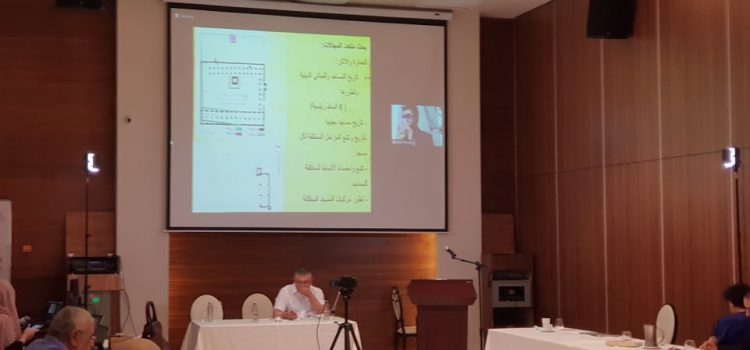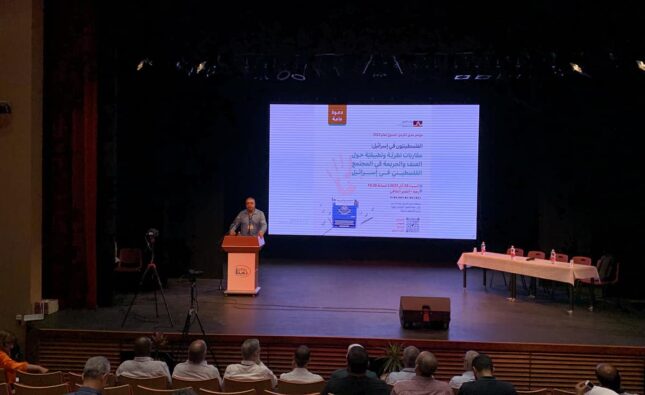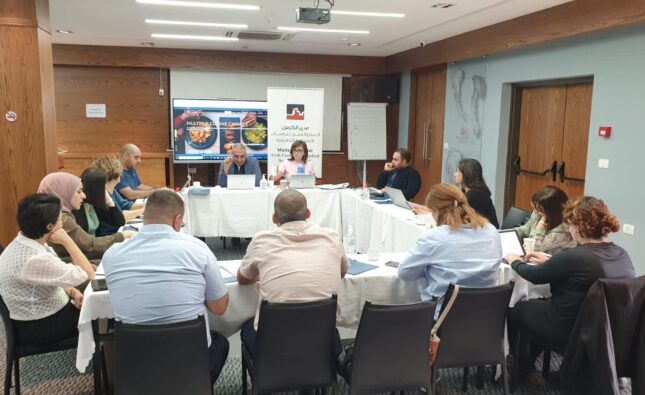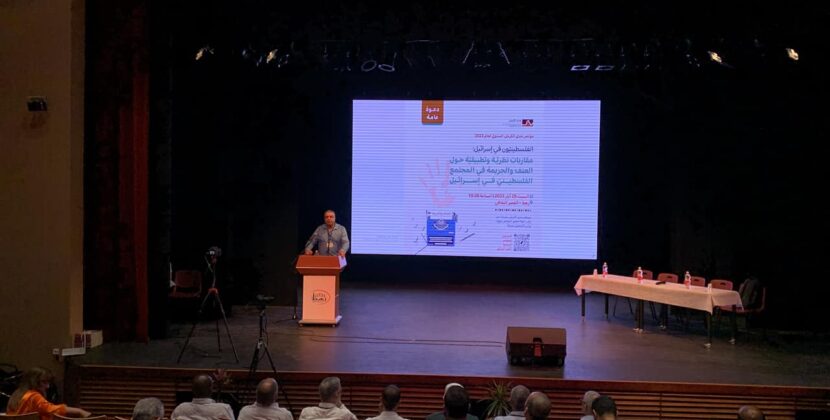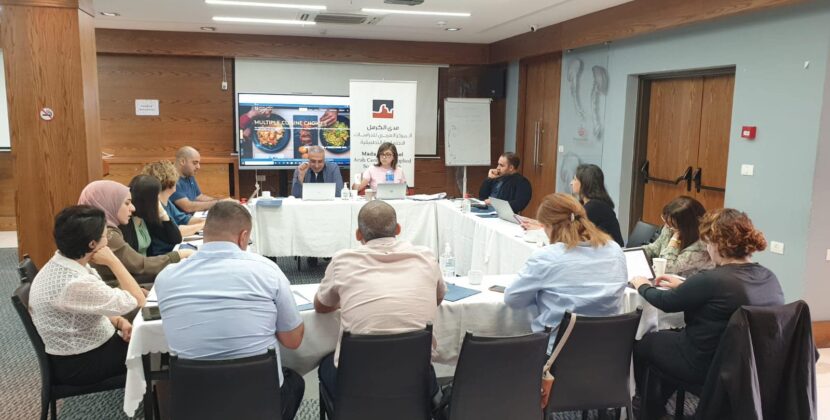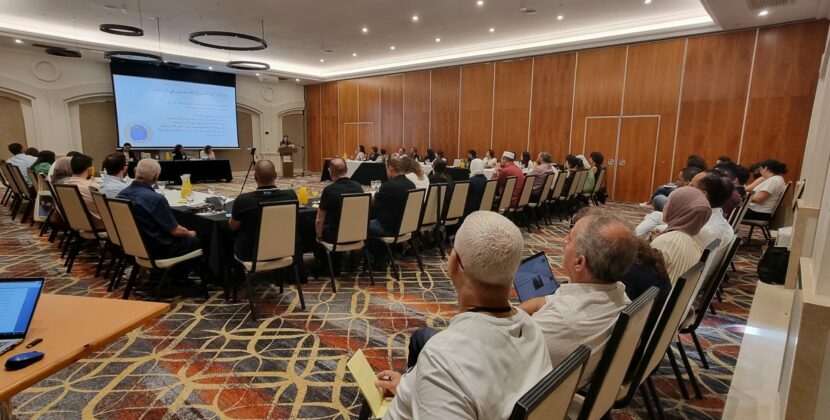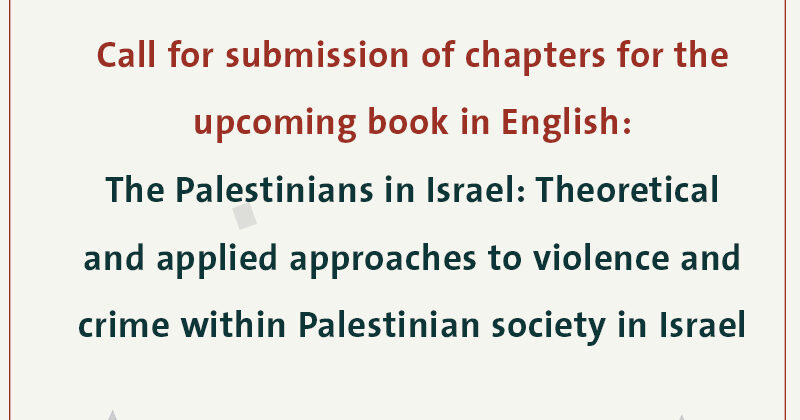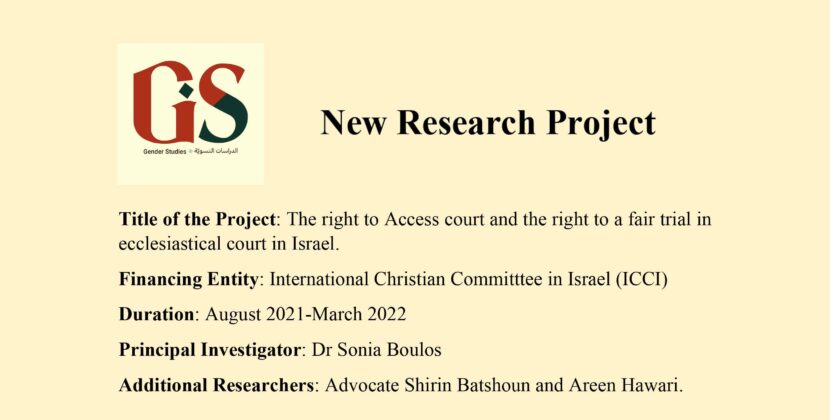In mid-July, eight Palestinian researchers presented their work at Mada’s 2020 Conference for doctoral students. The conference was held in Nazareth at the Ramada-Olivie Hotel; due to Coronavirus restrictions the lectures were given in closed sessions with only the speakers and discussion participants in attendance. However, Mada set up a live video broadcast of the conference which was available for public viewing over Facebook and other social media sites. The speakers, all from the new generation of Palestinian researchers, presented their work and discussed it with academics, researchers and activists. The day’s program was made up of presentations of a variety of topics, such as architectural history, children’s literature, social work, and public health. The conference is a fantastic chance for Palestinian scholars to present their work to the community and interested public, and helps them on their way to developing their academic careers. It is also a great opportunity to see the diversity, dynamism, and high quality of contemporary Arabic-language Palestinian academia in Israel.
Proceedings opened with a welcome address from Dr Mohanad Mustafa, a member of the conference’s academic committee and general director of Mada al-Carmel, in which he outlined the aim of the conference: to stimulate the production of knowledge from Palestinian perspectives, employing rigorous research methods and written in the Arabic language, given that language itself is a critical part of knowledge and human life. He concluded by stressing the renewed importance of quality research and study, given the need to understand the transformations across society, politics, public health, and the economy that we are currently are living through.
The inaugural lecture of the day was given by Dr Nimer Sultany, lecturer at the School of Oriental and African Studies (SOAS), University of London. Entitled “Academia between Neoliberalism and Resistance”, Sultany sought to address the issue of how we produce anti-hegemonic scholarship, meaning the production of knowledge that resists hegemonies of liberalism, capitalism and inequality, and helps to challenge injustice in all places.
The conference was split into two sessions, the first of which, entitled “Palestine: Historical and Social Approaches” was presided over by Dr Ayman Agbariya, head of the program of Society, Culture and Education at the University of Haifa. Four research projects were presented during this session. The first was entitled “The Influence of the Crusader Occupation on Religious Architecture in Palestine” from researcher Abd al Razziq Mattany, doctoral student at Ben Gurion University’s School of Architecture. Mattany reviewed the extent of Crusader influence by comparing religious buildings in Palestine to those in other parts of greater Syria that did not fall under Crusader occupation. Drawing on a chapter of his doctoral thesis, he discussed the development of mosque architecture in the Ajnaad (military districts of the early Caliphates) of Palestine and Jordan, from the Islamic conquests to the start of the twentieth century.
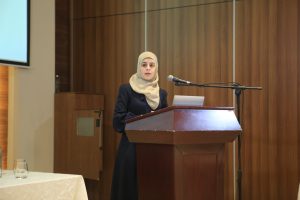
The second piece of research to be presented, entitled “Between the Mountain and the Sea: Sewer Networks and Neighbourhood Relations in Mandate-era Haifa”, came from Ahmad Mahmood, doctoral student in the department of Islamic Middle Eastern Studies at the Hebrew University of Jerusalem. Mahmood discussed the condition of the sewer networks as site of convergence between British colonial rule and the local administration of daily life, and the field of public health in the first decade of the Mandate period in Haifa.
The third piece of research presented came from Khaled Anabtawi, doctoral student of sociology and anthropology at the Geneva Institute in Switzerland. His presentation was titled “People’s Perceptions of Sectarianism: How does Political Sectarianism Produce its Sects Locally?” Anabtawi claims that when sectarian boundaries are drawn, affiliation to the group and to the wider collective shifts in a way which does not necessarily reflect the purported values of that sect. The group prioritises imagined social and political interests, particularly those of the elite, in discourse and in practice, and thus sectarianism turns into a key player in local politics.
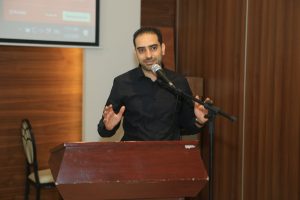
The fourth and final contribution to the session came from Halima Abu Haneya, a doctoral student of sociology from Bir Zeit University, and was entitled “Socio-economic Transformations in Jerusalem’s Shuafat Refugee Camp: 1965-2018”. Haneya claims that the discrimination and tough conditions which the residents of Shuafat have undergone have paradoxically functioned as sources of strength, driving them to empower themselves in order to overcome their marginalisation, as if breaking a barrier of their fear of the coloniser. These challenges, and finding ways of responding to them, thus became constituent parts of a Palestinian toolkit of resistance and Sumud (steadfastness).
The second session of the conference carried the title “Identity and Practices in Diverse Palestinian Contexts”, and was presided over by Dr Khaled Abu Asbeh, lecturer and supervisor of the doctoral program in Education at the Arab-American University, Ramallah. There were also four presentations in this session, the first of which was given by Rola (Hamid) Abu Zaid O’Neill, who obtained a PhD in sociology from the University of Cork in Ireland. In her presentation, Abu Zaid O’Neill discussed the topic of “Women, Memory and the Nakba: A case study of Internally Displaced Palestinian Women in Israel” and the role of mothers and grandmothers in transmitting the Palestinian story, as well as how they turned stories and narratives into instruments for generating a sense of cultural belonging. Stories were also used to raise awareness of the Palestinian’s historical and national oppression, and to express the emotions and memories of the generation who experienced the Nakba.
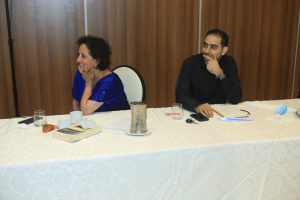
The second presentation in the second session came under the title “Mechanisms of Oppression and the Experiences of Female Palestinian Lawyers in the Jewish state.” It was presented by Bana Shoughry, doctoral student at the Hebrew University’s school of law. Her work sheds light on the oppression experienced by female Palestinian lawyers on account of their gender and their nationality. She also discusses the tactics of resistance these women use to keep struggling for the issues they believe in.
This was followed by a presentation from Loay Wattad, PhD candidate at Tel Aviv University’s department of sociology. The title of his presentation was “Minority Literature for Minority Readers: A Comparative Analysis of Palestinian Children’s Books in the West Bank and Israel”. Wattad argues that engaging in critical readings of children’s books reveals their political import. Points of view found therein that are seen as ‘childish’ are often deeply original and can reveal unexplored and different political dimensions.
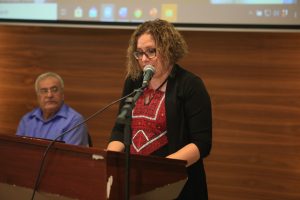
The final presentation of the day came from Leena Gnam Badram, PhD student from Haifa University’s school of social work. Her topic was “Between Religion and Secularism: Charting the Difference Between the Recommendations of Muslim Social Workers and Imams Regarding Marriage, Divorce and Child Custody Issues of Persons with Mental and/or Physical Disabilities”. She claims in her work that even though the Palestinian community in Israel is dynamic and ever-changing, the treatment of issues of mental health and learning difficulties is still massively informed by religion and tradition. This can include ineffective or problematic remedial treatments.
Web broadcasts of the conference attracted over 7000 viewers, many of whom left comments of appreciation and thanked to Mada for their efforts, with many praising the high quality of the speakers this year. One commenter had the following to say about the conference: “Language is a manifestation of the nation’s creativity. My respect to these students for presenting their research topics in Arabic- the significance of this should not be underestimated.”





